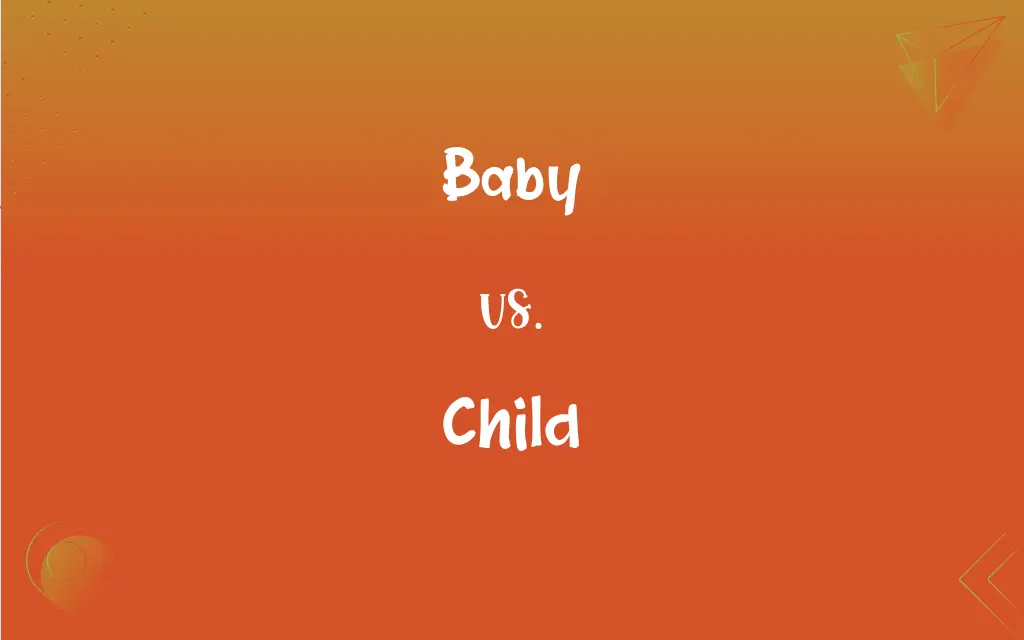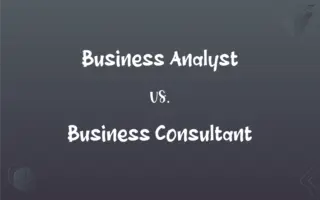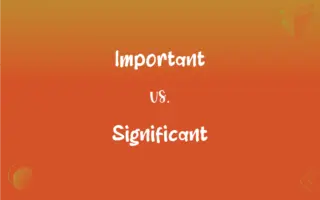Baby vs. Child: What's the Difference?
Edited by Aimie Carlson || By Janet White || Published on January 5, 2024
A baby is a very young human, typically under two years, while a child refers to a young person from infancy to puberty.

Key Differences
A baby is typically considered to be from birth to around 2 years old, a time marked by rapid physical and cognitive development. A child, in a broader sense, includes this baby stage but extends to the onset of puberty, encompassing a wider range of developmental stages.
Babies are highly dependent on adults for all their needs, including feeding and mobility. Children, as they grow, develop greater independence, acquiring skills like walking, talking, and self-feeding.
Social and emotional development in babies involves basic interactions, like smiling and recognizing close individuals. As children, these interactions become more complex, including forming friendships and understanding emotions.
Babies communicate primarily through crying and basic sounds, gradually learning words. Children develop more complex language skills, engaging in conversations and expressing detailed thoughts.
Physical growth in babies is rapid, with milestones like sitting and crawling. Children experience a more varied physical development, engaging in diverse activities like running, playing sports, and artistic pursuits.
ADVERTISEMENT
Comparison Chart
Age Range
0-2 years
Infancy to puberty
Dependency
High dependency on adults
Developing independence
Developmental Stages
Rapid physical and cognitive growth
Broader range of physical, emotional, and cognitive development
Communication
Crying, basic sounds, beginning words
Complex language and conversations
Activities and Milestones
Sitting, crawling, early walking
Running, playing, diverse learning activities
ADVERTISEMENT
Baby and Child Definitions
Baby
Baby refers to a newly born human.
The baby slept peacefully in her crib.
Child
Child refers to a stage of growth and development.
As a child, she loved to explore the outdoors.
Baby
A baby is in the infant stage of life.
The baby just learned to roll over.
Child
A child is developing independence and skills.
The child learned to tie his shoes by himself.
Baby
A baby is highly dependent on caregivers.
The baby needs to be fed every few hours.
Child
Legally, a child is a person under a certain age.
The law protects the rights of the child.
Baby
A baby undergoes rapid early development.
It's amazing how quickly a baby grows in the first year.
Child
A child is a young person, typically under the age of puberty.
The child was excited to start school.
Baby
A baby is in the initial phase of life.
The baby's first laugh was a delightful moment.
Child
A child is in the pre-adolescent stage.
The child joined a soccer team with her friends.
Baby
A very young child; an infant.
Child
A person between birth and puberty.
Baby
An unborn child; a fetus.
Child
A person who has not attained maturity or the age of legal majority.
FAQs
What is a child?
A child is a young person, from infancy through the pre-adolescent years.
At what age does a baby become a child?
A baby transitions to being called a child after around 2 years.
Can a baby speak?
Babies generally start speaking basic words around their first year.
How long is the baby stage?
The baby stage usually lasts from birth up to about 2 years.
What are key milestones for a baby?
Key milestones for a baby include sitting, crawling, and beginning to walk.
What activities are typical for a child?
Typical activities for a child include playing, learning, and socializing.
What distinguishes a child’s communication?
A child's communication involves more complex language and conversations.
How do emotional expressions differ between babies and children?
Babies show basic emotions, while children express more complex feelings.
What defines a baby?
A baby is a very young human, typically from birth to 2 years old.
Is a toddler a baby or a child?
A toddler is a transition stage from baby to child, typically from 1 to 3 years.
Are the dietary needs of a baby different from a child?
Yes, babies initially require milk or formula, while children eat a more varied diet.
How do children learn differently from babies?
Children learn through more diverse experiences and structured education compared to babies.
What are the legal rights of a baby?
A baby has legal rights to care and protection, similar to older children.
How do parents prepare for a baby’s arrival?
Preparing for a baby involves setting up a safe, nurturing environment.
What healthcare considerations are important for babies?
Regular check-ups and vaccinations are vital healthcare considerations for babies.
What are common educational methods for children?
Common educational methods for children include schooling and play-based learning.
How do toys for babies differ from children’s toys?
Baby toys are usually for sensory and motor skills, while children’s toys are more varied and interactive.
What role does family play in a baby’s development?
Family plays a crucial role in providing care and early learning for a baby.
Can children engage in team sports?
Yes, children can participate in team sports, which is less common for babies.
Do babies recognize their parents?
Yes, babies can recognize and become attached to their parents early on.
About Author
Written by
Janet WhiteJanet White has been an esteemed writer and blogger for Difference Wiki. Holding a Master's degree in Science and Medical Journalism from the prestigious Boston University, she has consistently demonstrated her expertise and passion for her field. When she's not immersed in her work, Janet relishes her time exercising, delving into a good book, and cherishing moments with friends and family.
Edited by
Aimie CarlsonAimie Carlson, holding a master's degree in English literature, is a fervent English language enthusiast. She lends her writing talents to Difference Wiki, a prominent website that specializes in comparisons, offering readers insightful analyses that both captivate and inform.






































































